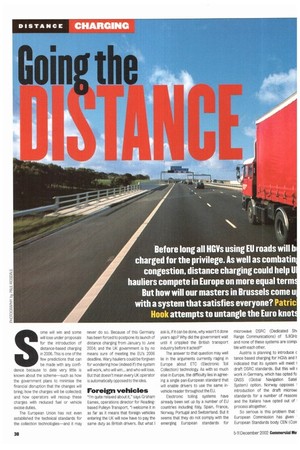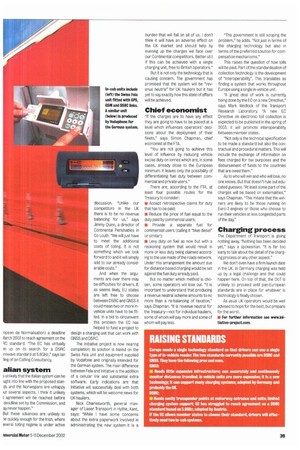Before long all HGVs using EU roads will b charged
Page 38

Page 39

If you've noticed an error in this article please click here to report it so we can fix it.
for the privilege. As well as combatin congestion, distance charging could help U hauliers compete in Europe on more equal term But how will our masters in Brussels come u with a system that satisfies everyone? Patric Hook attempts to untangle the Euro knot Some will win and some will lose under proposals for the introduction of distance-based charging in 2006. This is one of the few predictions that can be made with any confidence because to date very little is known about the scheme—such as how the government plans to minimise the financial disruption that the changes will bring; how the charges will be collected: and how operators will recoup these charges with reduced fuel or vehicle excise duties.
The European Union has not even established the technical standards for the collection technologies—and it may never do so. Because of this Germany has been forced to postpone its launch of distance charging from January to June 2004: and the UK government is by no means sure of meeting the EU's 2006 deadline. Wary hauliers could be forgiven for wondering howl indeed if) the system will work, who will win.., and who will lose. But that doesn't mean every UK operator is automatically opposed to the idea.
Foreign vehicles
"I'm quite relaxed about it," Says Graham Eames, operations director for Readingbased Pulleyn Transport. "I welcome it in as far as it means that foreign vehicles entering the UK will now have to pay the same duty as British drivers. But what I
ask is, if it can be done, why wasn't it done years ago? Why did the government wait until it crippled the British transport industry before it acted?"
The answer to that question may well lie in the arguments currently raging in Europe about ETC (Electronic Toll Collection) technology. As with so much else in Europe, the difficulty lies in agreeing a single pan-European standard that will enable drivers to use the same invehicle reader throughout the EU.
Electronic tolling systems have already been set up by a number of EU countries including Italy, Spain, France, Norway, Portugal and Switzerland. But it seems that they do not comply with the emerging European standards for microwave DSRC (Dedicated Shi Range Communications) of 5.8GHz and none of these systems are comp; ble with each other.
Austria is planning to introduce c tance based charging for HGVs and t indicated that its system will meet 1 draft DSRC standards. But this will work in Germany, which has opted fo GNSS (Global Navigation Satel System) option. Norway opposes introduction of the draft microm standards for a number of reason: and the Italians have opted out of process altogether.
So serious is this problem that European Commission has given European Standards body CEN (Con opeen de Normalisation) a deadline 'arch 2003 to reach agreement on the RC standard. "The EC has virtually m up on its search for a DSRC rowave standard at 5.8GHz," says Ian ling of Lan Catling Consultanct
alian system
s unlikely that the Italian system can be ught into line with the proposed stands and the Norwegians are unhappy iut several aspects. I think it unlikely
t agreement will be reached before deadline set by the Commission, and ay never happen."
But these advances are unlikely to le quickly enough for the Irish, where eneral tolling regime is under active discussion. "Unlike our competitors in the UK there is to be no revenue balancing for us," says Jimmy Quinn, a director of Continental Perishables in Co Louth. "We will just have to meet the additional costs of tolling. It is not something which we look forward to and it will simply add to our aiready considerable costs."
And when the arguments are over there may be difficulties for drivers. lf, as seems likely, EU states are left free to choose between DSRC and GNSS it could mean two or more invehicle units have to be fitted. In a bid to circumvent this problem the EC has helped to fund a project to design a charging unit that can work with GNSS and DSRC.
The Initiative project is now nearing completion; its solution is based on the Swiss Feia unit and equipment supplied by Voclafone and originally intended for the German system. The main difference between Fele and Initiative Is the addition of a cellular link and substantial extra software. Early indications are that Initiative will successfully deal with both systems, which will be welcome news for UK hauliers.
Nick Charlesworth, general manager of Laser Transport in Hythe, Kent, says: "While I have some concerns about the extra paperwork involved in administrating the new system it is a burden that will fall on all of us. I don't think it will have an adverse effect on the UK market and should help by evening up the charges we face over our Continental competitors. Better still if this can be achieved with a single charging unit, free to British operators.'
But it is not only the technology that is causing concern. The government has promised that the system will be 'revenue neutral" for UK haulers but it has yet to say exactly how this state of affairs will be achieved.
Chief economist
"If the charges are to have any effect they are going to have to be placed at a level which influences operators' decisions about the deployment of their fleets," says Simon Chapman, chief economist at the ETA.
'You are not going to achieve this level of influence by reducing vehicle excise duty on lorries which are, in some cases, already close to the European minimum. It leaves only the possibility of differentiating fuel duty between commercial and private users."
There are, according to the FTA, at least four possible routes for the Treasury to consider:
• Accept retrospective claims for duty that has to be paid; • Reduce the price of fuel equal to the duty paid by commercial users;
• Provide a separate fuel for commercial users (calling it "blue diesel" or similar); • Levy duty on fuel as now but with a reckoning system that would result in more or less duty being claimed according to the use made of the roads network. Under this arrangement the amount due for distance-based charging would be set against the fuel duty already paid.
But no matter which method is chosen, some operators will lose out. "It is important to understand that producing a revenue neutral scheme amounts to no more than a re-balancing of taxation," says Chapman. "It is revenue neutral for the Treasury—not for individual hauliers, some of whom will pay more and some of whom will pay less. "The government is still scoping the problem," he adds. "Not just in terms of the charging technology but also in terms of the preferred solution for compensation mechanisms."
This raises the question of how tolls will be paid. Part of the standardisation of collection technology is the development of "interoperability". This translates as finding a system that works throughout Europe using a single in-vehicle unit.
"A great deal of work is currently being done by the EC on a new Directive," says Mark Wedlock of the Transport Research Laboratory. "A new EC Directive on electronic toll collection is expected to be published in the spring of 2003; it will promote interoperability between member states.
"Not only is the technical specification to be made a standard but also the contractual and procedural matters. This will include the exchange of information on fees charged for tax purposes and the disbursement of funds to the countries that are owed them."
As to who will win and who will lose, no one knows. But that doesn't rule out educated guesses. "At least some part of the charges will be based on externalities," says Chapman. "This means that the winners are likely to be those running on Euro-3 engines or those who choose to run their vehicles at less congested parts of the day."
Charging process
The Department of Transport is giving nothing away. "Nothing has been decided yet," says a spokesman. "it is far too early to talk about the detail of the charging process or any other aspect."
We don't even have a firm launch date in the UK. In Germany charging was held up by a legal challenge and that could happen here. On top of that, the DoT is unlikely to proceed until pan-European standards are in place for whatever is technology is finally chosen.
As usual UK operators would be well advised to hope for the best, but prepare for the worse • For further information see www.initiative-projectcom.
























































































































































